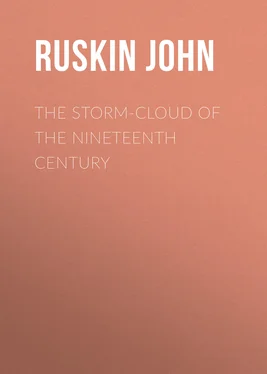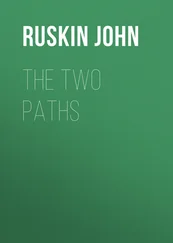John Ruskin - The Storm-Cloud of the Nineteenth Century
Здесь есть возможность читать онлайн «John Ruskin - The Storm-Cloud of the Nineteenth Century» — ознакомительный отрывок электронной книги совершенно бесплатно, а после прочтения отрывка купить полную версию. В некоторых случаях можно слушать аудио, скачать через торрент в формате fb2 и присутствует краткое содержание. Жанр: foreign_prose, literature_19, foreign_antique, на английском языке. Описание произведения, (предисловие) а так же отзывы посетителей доступны на портале библиотеки ЛибКат.
- Название:The Storm-Cloud of the Nineteenth Century
- Автор:
- Жанр:
- Год:неизвестен
- ISBN:нет данных
- Рейтинг книги:3 / 5. Голосов: 1
-
Избранное:Добавить в избранное
- Отзывы:
-
Ваша оценка:
- 60
- 1
- 2
- 3
- 4
- 5
The Storm-Cloud of the Nineteenth Century: краткое содержание, описание и аннотация
Предлагаем к чтению аннотацию, описание, краткое содержание или предисловие (зависит от того, что написал сам автор книги «The Storm-Cloud of the Nineteenth Century»). Если вы не нашли необходимую информацию о книге — напишите в комментариях, мы постараемся отыскать её.
The Storm-Cloud of the Nineteenth Century — читать онлайн ознакомительный отрывок
Ниже представлен текст книги, разбитый по страницам. Система сохранения места последней прочитанной страницы, позволяет с удобством читать онлайн бесплатно книгу «The Storm-Cloud of the Nineteenth Century», без необходимости каждый раз заново искать на чём Вы остановились. Поставьте закладку, и сможете в любой момент перейти на страницу, на которой закончили чтение.
Интервал:
Закладка:
Thus the Chaldean priest, to the brightness of the setting sun. Hear now the Greek girl, Myrrha, of his rising.
"The day at last has broken. What a night
Hath usher'd it! How beautiful in heaven!
Though varied with a transitory storm,
More beautiful in that variety: 7 7 'More beautiful in that variety.'—This line, with the one italicized beneath, expresses in Myrrha's mind, the feeling which I said, in the outset, every thoughtful watcher of heaven necessarily had in those old days; whereas now, the variety is for the most part, only in modes of disagreeableness; and the vapor, instead of adding light to the unclouded sky, takes away the aspect and destroys the functions of sky altogether.
How hideous upon earth! where peace, and hope,
And love, and revel, in an hour were trampled
By human passions to a human chaos,
Not yet resolved to separate elements:—
'T is warring still! And can the sun so rise,
So bright, so rolling back the clouds into
Vapors more lovely than the unclouded sky ,
With golden pinnacles, and snowy mountains,
And billows purpler than the ocean's, making
In heaven a glorious mockery of the earth,
So like,—we almost deem it permanent;
So fleeting,—we can scarcely call it aught
Beyond a vision, 't is so transiently
Scatter'd along the eternal vault: and yet
It dwells upon the soul, and soothes the soul,
And blends itself into the soul, until
Sunrise and sunset form the haunted epoch
Of sorrow and of love."
How often now —young maids of London,—do you make sunrise the 'haunted epoch' of either?
Thus much, then, of the skies that used to be, and clouds "more lovely than the unclouded sky," and of the temper of their observers. I pass to the account of clouds that are , and—I say it with sorrow—of the dis temper of their observers.
But the general division which I have instituted between bad-weather and fair-weather clouds must be more carefully carried out in the sub-species, before we can reason of it farther: and before we begin talk either of the sub-genera and sub-species, or super-genera and super-species of cloud, perhaps we had better define what every cloud is, and must be, to begin with.
Every cloud that can be, is thus primarily definable: "Visible vapor of water floating at a certain height in the air." The second clause of this definition, you see, at once implies that there is such a thing as visible vapor of water which does not float at a certain height in the air. You are all familiar with one extremely cognizable variety of that sort of vapor—London Particular; but that especial blessing of metropolitan society is only a strongly-developed and highly-seasoned condition of a form of watery vapor which exists just as generally and widely at the bottom of the air, as the clouds do—on what, for convenience' sake, we may call the top of it;—only as yet, thanks to the sagacity of scientific men, we have got no general name for the bottom cloud, though the whole question of cloud nature begins in this broad fact, that you have one kind of vapor that lies to a certain depth on the ground, and another that floats at a certain height in the sky. Perfectly definite, in both cases, the surface level of the earthly vapor, and the roof level of the heavenly vapor, are each of them drawn within the depth of a fathom. Under their line, drawn for the day and for the hour, the clouds will not stoop, and above theirs, the mists will not rise. Each in their own region, high or deep, may expatiate at their pleasure; within that, they climb, or decline,—within that they congeal or melt away; but below their assigned horizon the surges of the cloud sea may not sink, and the floods of the mist lagoon may not be swollen.
That is the first idea you have to get well into your minds concerning the abodes of this visible vapor; next, you have to consider the manner of its visibility. Is it, you have to ask, with cloud vapor, as with most other things, that they are seen when they are there, and not seen when they are not there? or has cloud vapor so much of the ghost in it, that it can be visible or invisible as it likes, and may perhaps be all unpleasantly and malignantly there, just as much when we don't see it, as when we do? To which I answer, comfortably and generally, that, on the whole, a cloud is where you see it, and isn't where you don't; that, when there's an evident and honest thundercloud in the northeast, you needn't suppose there's a surreptitious and slinking one in the northwest;—when there's a visible fog at Bermondsey, it doesn't follow there's a spiritual one, more than usual, at the West End: and when you get up to the clouds, and can walk into them or out of them, as you like, you find when you're in them they wet your whiskers, or take out your curls, and when you're out of them, they don't; and therefore you may with probability assume—not with certainty, observe, but with probability—that there's more water in the air where it damps your curls than where it doesn't. If it gets much denser than that, it will begin to rain; and then you may assert, certainly with safety, that there is a shower in one place, and not in another; and not allow the scientific people to tell you that the rain is everywhere, but palpable in Tooley Street, and impalpable in Grosvenor Square.
That, I say, is broadly and comfortably so on the whole,—and yet with this kind of qualification and farther condition in the matter. If you watch the steam coming strongly out of an engine-funnel, 8—at the top of the funnel it is transparent,—you can't see it, though it is more densely and intensely there than anywhere else. Six inches out of the funnel it becomes snow-white,—you see it, and you see it, observe, exactly where it is,—it is then a real and proper cloud. Twenty yards off the funnel it scatters and melts away; a little of it sprinkles you with rain if you are underneath it, but the rest disappears; yet it is still there;—the surrounding air does not absorb it all into space in a moment; there is a gradually diffusing current of invisible moisture at the end of the visible stream—an invisible, yet quite substantial, vapor; but not, according to our definition, a cloud, for a cloud is vapor visible .
Then the next bit of the question, of course, is, What makes the vapor visible, when it is so? Why is the compressed steam transparent, the loose steam white, the dissolved steam transparent again?
The scientific people tell you that the vapor becomes visible, and chilled, as it expands. Many thanks to them; but can they show us any reason why particles of water should be more opaque when they are separated than when they are close together, or give us any idea of the difference of the state of a particle of water, which won't sink in the air, from that of one that won't rise in it? 9
And here I must parenthetically give you a little word of, I will venture to say, extremely useful, advice about scientific people in general. Their first business is, of course, to tell you things that are so, and do happen,—as that, if you warm water, it will boil; if you cool it, it will freeze; and if you put a candle to a cask of gunpowder, it will blow you up. Their second, and far more important business, is to tell you what you had best do under the circumstances,—put the kettle on in time for tea; powder your ice and salt, if you have a mind for ices; and obviate the chance of explosion by not making the gunpowder. But if, beyond this safe and beneficial business, they ever try to explain anything to you, you may be confident of one of two things,—either that they know nothing (to speak of) about it, or that they have only seen one side of it—and not only haven't seen, but usually have no mind to see, the other. When, for instance, Professor Tyndall explains the twisted beds of the Jungfrau to you by intimating that the Matterhorn is growing flat; 10or the clouds on the lee side of the Matterhorn by the wind's rubbing against the windward side of it, 11—you may be pretty sure the scientific people don't know much (to speak of) yet, either about rock-beds, or cloud-beds. And even if the explanation, so to call it, be sound on one side, windward or lee, you may, as I said, be nearly certain it won't do on the other. Take the very top and center of scientific interpretation by the greatest of its masters: Newton explained to you—or at least was once supposed to have explained—why an apple fell; but he never thought of explaining the exactly correlative, but infinitely more difficult question, how the apple got up there!
Читать дальшеИнтервал:
Закладка:
Похожие книги на «The Storm-Cloud of the Nineteenth Century»
Представляем Вашему вниманию похожие книги на «The Storm-Cloud of the Nineteenth Century» списком для выбора. Мы отобрали схожую по названию и смыслу литературу в надежде предоставить читателям больше вариантов отыскать новые, интересные, ещё непрочитанные произведения.
Обсуждение, отзывы о книге «The Storm-Cloud of the Nineteenth Century» и просто собственные мнения читателей. Оставьте ваши комментарии, напишите, что Вы думаете о произведении, его смысле или главных героях. Укажите что конкретно понравилось, а что нет, и почему Вы так считаете.












